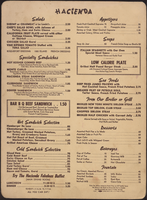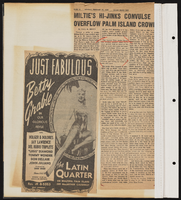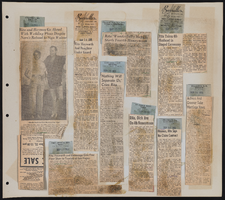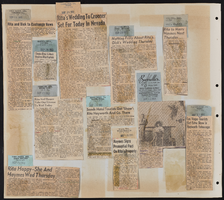Search the Special Collections and Archives Portal
Search Results

Hacienda menu
Date
Archival Collection
Description
Text
Young Electric Sign Company (YESCO) Corporate Records
Identifier
Abstract
The Young Electric Sign Company (YESCO) Corporate Records (1914-2000) document the history of the Young Electric Sign Company (YESCO) and is comprised of photographs of sign production and finished signs, negatives, slides, transparencies, anniversary scrapbooks, and videotapes. The collection also contains meeting minutes, correspondence, price books, drawings, calculations, newspaper and trade magazine articles on YESCO, advertising materials, and oral history interviews and audio recordings of YESCO designers and executives. YESCO is responsible for many of the neon signs in and around Las Vegas, Nevada and Reno, Nevada, as well as other Western states.
Archival Collection
Leprechaun Mining and Chemical, Inc. Records
Identifier
Abstract
The Leprechaun Mining and Chemical, Inc. Records from 1954 to 1998 contain business information, Foot Chemical Company partnership documentation, meetings, audit and investment reports, financial papers, and stock certificates and transfers. Also included is data on the minerals mined in Nevada, such as salt, potash, and lithium.
Archival Collection

Transcript of interview with Santo Savino by Lisa Gioia-Acres, September 23, 2008
Date
Archival Collection
Description
Santo was born in the Bronx, New York in 1937. Santo’s family includes his father who was a butcher, and his mother who mostly stayed at home to raise the children, as well as a brother who currently lives with Santo. Santo recalls that it was great growing up in the Bronx, and he spent most of his life there until he joined the Air Force when he was 17. Santo’s immediate family was not musically oriented, but he learned to play the drums from a cousin. Music came easy for Santo, and he started getting paid for playing when he was 12. At 17, Santo joined the Air Force with a group of friends. He auditioned for and was accepted into the Air Force band where he played drums for four years. Santo was married with a child and another child on the way when he ended his military career and moved to California. After jobs working as a security guard and on an assembly line, Santo knew he just wanted to play and came to Las Vegas in 1960 to play with a band. It took several years before Santo was able to get on with a permanent band. Once Santo broke into the scene in Las Vegas, he played for six years at the Flamingo. Following that he was on the road for a couple of years with Paul Anka. Upon returning to Las Vegas, Santo worked for 14 years at the Sahara. Santo talks about when “the boys” had the hotels before the corporations came in and how everything changed. Currently, Santo does a lot of work with trumpet player Carl Saunders, frequently traveling to Los Angeles to do recordings together.
Text

Interview with Navor Tito Valdez, June 20, 2005
Date
Archival Collection
Description
Text





